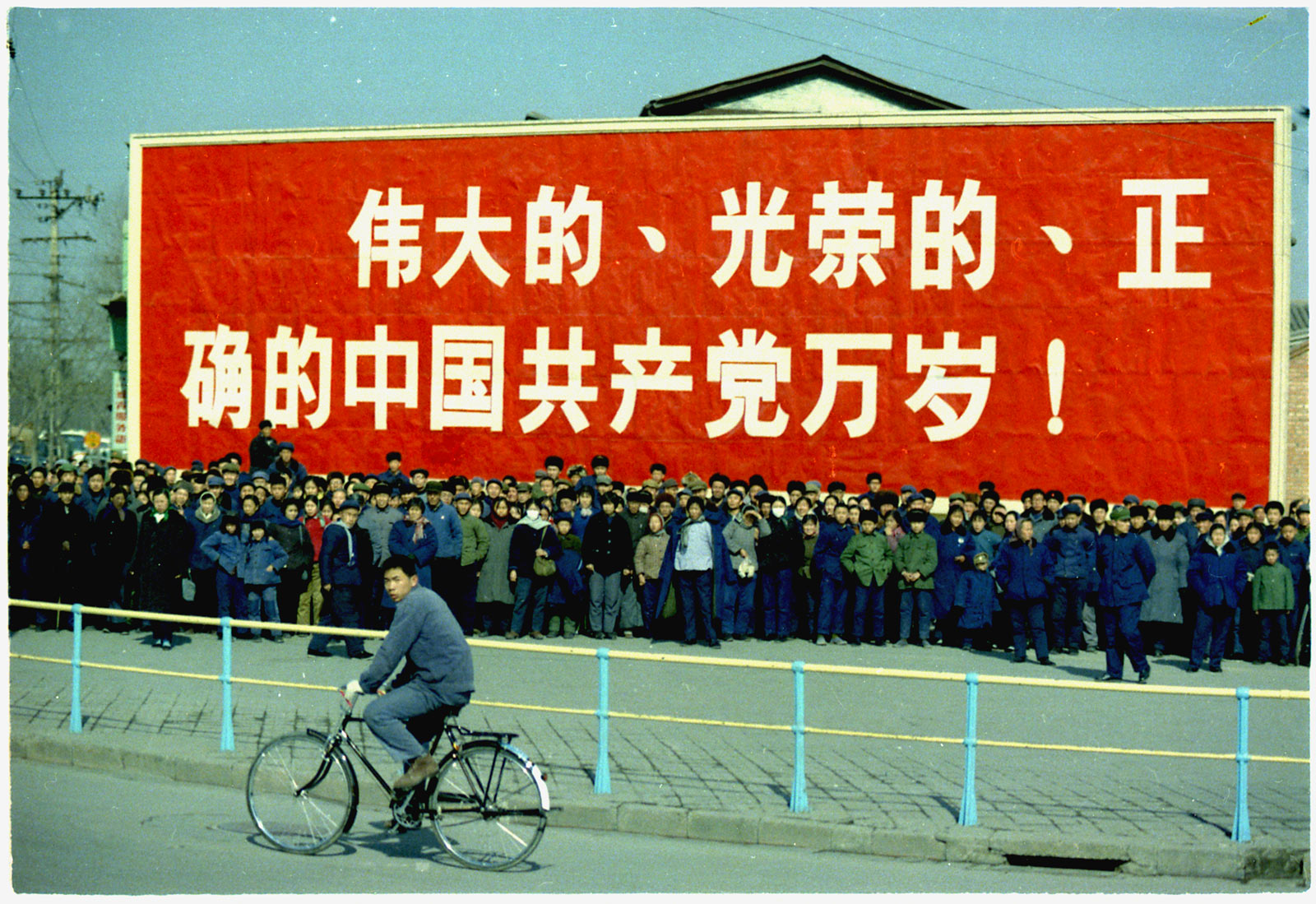
Great, Glorious, and Correct: The Origins and Afterlives of a Maoist Slogan
On 1 July 2021, General Secretary Xi Jinping stood atop Tiananmen Gate and thrust his fist in the air while saying: ‘Long live the great, glorious, and correct Chinese Communist Party.’ It was the dramatic conclusion to his speech commemorating the one-hundredth anniversary of the founding of the Chinese Communist Party (CCP).
Descriptions of the Party as ‘great, glorious, and correct’ (伟大、光荣、正确) appear occasionally in official media and on banners at important Party events. The abbreviated version of the slogan, wei guangzheng (伟光正), uses the first character of each word and looks like a person’s name, for which reason in the rest of the essay I will refer to it by its popular usage as a person named Wei Guangzheng. This shorthand, which in popular culture means ‘righteous’ or ‘politically correct’ verging on ‘delusionally arrogant’, appears much more frequently in casual conversation and online discourse these days than the Party’s own proclamation of its eternal correctness. In recent months, Chinese-language blogs and social media posts have used the phrase to criticise and satirise the ascension of Kamala Harris as the Democratic Party nominee for US President in the wake of Joe Biden’s decision to step down (H-O-O-H 2024), Prime Minister Justin Trudeau and Canada’s carbon tax (flyinmatrix 2024), the Israeli army’s killing of Palestinian civilians (iMoeAya 2024), and the Democratic Progressive Party of Taiwan (irvinedai 2024), among many other topics. How did this happen? How did an official slogan, used rather sparingly and with a touch of embarrassment by the Party that invented it, take on a critical life of its own?
Origins
Tracing the birth and growth of the idea that would eventually become Wei Guangzheng sheds light on how the CCP has handled flawed formulations during different historical periods and how theorists struggle to explain official slogans and how satirists poke fun at them. Mao Zedong’s decision to use the word ‘correct’ to describe the Party in 1951 is the key to understanding the staying power of Wei Guangzheng. ‘Great’ and ‘glorious’ seem like meaningless puffery, easy to ignore. Of course the Party would call itself great and glorious; what else could it possibly be? But what would be the propaganda value of any political party proclaiming its essential correctness? Nobody is perfect. Why would a ruling party give potential critics such an easy opening to point out all the times it has been mistaken or incorrect?
In An Anatomy of Chinese: Rhythm, Metaphor, Politics, Perry Link writes about the concept of speaking correctly in the context of the politics of the PRC. Link (2013: 16) analyses the ‘great, glorious, and correct Communist Party’ slogan, noting the percussive rhythm of the phrase and the importance of putting the three adjectives in their proper order. Who made up the phrase in the first place? Party history researcher Lu Yuan published an article about the birth of the formulation in 1996. According to Lu, comrades writing a chronology of CCP history during the 1980s had always thought that Liu Shaoqi was the originator of the idea that the Party was great, glorious, and correct. Liu was indeed the first Party leader to start popularising and explaining the formulation in March 1951, which is why Bao Tong (2016) has attributed the phrase to Liu and praised him for genuinely wanting the Party to admit to its mistakes.
It was, however, Mao Zedong who first used the phrase in February 1951 in his ‘Main Points of the Resolution Adopted at the Enlarged Meeting of the Political Bureau of the Central Committee of the Communist Party of China’. In a section about Party rectification and Party-building, Mao wrote:
Ours is a Party that is great, glorious and correct; this is the principal aspect which must be affirmed and made clear to cadres at all levels. However, it must also be made clear to them that there are problems which have to be straightened out and that in the new liberated areas a prudent attitude should be adopted towards Party building. (In English, Mao 1977a: 47; in Chinese, Mao 1977b: 36)
According to Lu Yuan, Mao had two reasons to proclaim the Party’s gloriousness in early 1951. The first was a response to international critiques of the CCP as a peasant party that was backward or somehow less legitimate than other communist parties worldwide whose members came from the urban industrial working class. To Mao, the CCP represented the interests of the working class and was therefore as great and glorious as any other communist party. The second reason had to do with the rapid expansion of Party membership since 1949, which had prompted Gao Gang, head of the Northeast Bureau, to complain that rich peasants and bad elements had been allowed to join the Party. This is the source of Mao’s emphasis on correctness. He was saying yes, of course there are problems. Whenever we face problems, we will correct them. And no matter how many problems we face, it is important to emphasise the overall correctness of CCP rule. Mao’s message was: do not play up problems to question the Party’s right to rule.
In this origin story, Lu Yuan did not mention what else was on Mao’s mind in February 1951. China’s most decisive wartime victories against US and UN forces in Korea had occurred between November 1950 and January 1951. Mao’s son Mao Anying was killed by American bombs on 25 November 1950 (Zhou Enlai waited until 2 January 1951 to inform Mao of his son’s death). On 10 February 1951, US troops recaptured Inchon after having abandoned the port a month earlier. On 18 February—the same day that Mao wrote that the Party was great, glorious, and correct—US reports confirmed ‘an enemy withdrawal along the entire central front’ and, in mid-March, UN troops retook Seoul. The war had been a surprising source of greatness and glory for China in late 1950 but by February 1951, battlefield setbacks and mourning his son must have shaken Mao. Why else did he feel the need to say that the Party (meaning himself) should always be considered correct, despite occasional problems?
Mao need not have worried. His decision to ‘resist America and aid Korea’—which was made over the objections of top People’s Liberation Army generals—along with the death of his son in the war, which was a pivotal event in his life, as highlighted by Frederick Teiwes and Warren Sun (2007: 625–26), solidified Mao’s role among the Party elite as a man apart and an infallible genius whose decisions and motives could not be openly questioned. China’s battlefield victories against the most powerful army in the world had proven that Mao was correct to overrule his overly cautious comrades. And he had suffered a parent’s worst nightmare: his son was buried in a martyrs’ cemetery in Korea. What a sacrifice. How great, glorious, and unquestionably correct.
After Liu Shaoqi spoke about the great, glorious, and correct phrase in March 1951, a writer named Qin Chuan (who would become editor in chief of People’s Daily during the 1980s) published a 24-page book titled The Great, Glorious, and Correct Communist (偉大、光榮、正確的共產黨人), featuring such chapters as ‘The Most Loyal and Courageous’, ‘The Most Visionary’, ‘The Most Selfless’, ‘The Most Progressive’, and ‘The Most Disciplined’. After an initial print run of 30,000 copies in July 1951, the Northwest People’s Publishing House churned out 760,000 copies by June 1952. Qin devotes most of his space to explaining how Party members can embody greatness and gloriousness, although the chapter on discipline mentions how Zhang Guotao’s pursuit of a mistaken line resulted in his expulsion from the Party in 1938 and underscores the importance of democratic centralism (Qin 1951: 21). The appearance of Qin’s book in 1951 makes sense in the context of the rapid growth in CCP membership that Mao had in mind when he spoke about fundamental correctness and occasional errors. It was a manual for new Party members, reminding them to aspire to greatness and avoid mistakes.
In 1952 and 1953, two People’s Daily articles about punishing cadres who had wrongly accused people of being counterrevolutionaries featured exonerated men praising the Party’s ‘greatness, glory, and correctness’ in overturning unjust verdicts and punishing bad officials. These reports are part of the genre that Aminda Smith (2021) examines in her article analysing a moment when the Party publicised punishing cadres’ mistakes during the early 1950s. The pieces are rare examples of the Wei Guangzheng slogan appearing in official propaganda in the way that Liu Shaoqi had hoped it would be used: to celebrate a Party that admits its mistakes and corrects them.
After 1953, Wei Guangzheng went into hibernation until the height of the Mao cult during the Cultural Revolution, when the phrase appeared on Mao badges, propaganda posters, and a wall photographed by White House photographer Byron Schumaker in February 1972 as President Richard Nixon’s motorcade drove through Beijing. The Cultural Revolution version of Wei Guangzheng, divorced from its 1950s context, represents the hardened version of the slogan discussed by Perry Link. Its correct order and percussive rhythm, not its substance or original intention, became the point. It had become a proper name. But not an unproblematic one.

Afterlives
When Xi Jinping thrust his fist in the air on Tiananmen Gate on the CCP’s one-hundredth birthday in 2021, he was reciting the Cultural Revolution version of the formula. He was not considering its original context or the part of the phrase that raises questions. The ‘correct’ part of the slogan is a problem. Party theorists understand this, especially in the aftermath of the Beijing massacre of 1989, which was difficult to plausibly depict as the action of an eternally correct Party. Hu Sheng, director of the Chinese Academy of Social Sciences, directly tackled the trouble with proclaiming correctness at a CCP history conference in 1996. ‘Great and glorious are adjectives’, Hu (1996: 18) said, but ‘correct is an essence. Being correct or incorrect is something rigid. If you are wrong, you have failed; if you are correct, you have succeeded.’ Hu made sure to say that the victory of the Chinese revolution was the result of the Party’s correct leadership and proof of its correctness, but his bigger point was to explain that the phrase had never meant to imply that the Party was always correct.
The rest of Hu’s speech dwelled extensively on periods, especially the Cultural Revolution, when a mistaken or incorrect line dominated Chinese politics. Yet even during the worst periods of erroneous CCP leadership, Hu said, correctness was always present, resisting and fighting against the incorrectness and leading to the outcome of a stronger, better Party. Hu even made two oblique references to June Fourth, saying that ‘our Party faced the danger of collapsing but we did not collapse, we withstood’ the crisis. Probably exhausted by his twisted logic, Hu backed off by the end of his speech. He concluded by saying:
It might seem like my speech is defending what Chairman Mao and Comrade Shaoqi said more than 40 years ago about the Party being great, glorious, and correct, but I am not advocating that we say it all over the place now. All I am saying is that the phrase is not wrong—the entirety of the Party’s history can illustrate this point. (Hu 1996: 25)
Hu’s final message, urging his audience to avoid overusing the slogan, helps to explain why Wei Guangzheng is not more ubiquitous and instead pops up on special occasions like the Party’s birthday. In 1996, Hu had no idea what the internet would become. Unofficial online responses to official slogans have given Wei Guangzheng a life of its own over the past two decades.
Xiao Qiang and the team at China Digital Times have documented how netizens have used the term ‘great, glorious, and correct’ to poke fun at the CCP and critique top leaders’ self-righteousness, especially between 2009 and 2014 (China Digital Times 2023: 47). In 2009, someone created a fake Baidu encyclopedia entry for ‘Comrade Wei Guangzheng’: an amazing founding leader, who propagated a line of little Weis (‘little Greats’), whose genetic mutations caused them to pursue power and money and then turn against ‘a small handful of people’ (一小撮)—the term the Party uses to denigrate its opponents (Baidu Baike 2009). More recently, the three-character phrase has become shorthand for a type of person, speech, film, or TV show that adheres strictly to Party orthodoxy. Used in this sense, Wei Guangzheng now means righteous, politically correct, or unbearably arrogant. It can be used positively or negatively depending on the context and the speaker. Hundreds of references to Wei Guangzheng pop up every day on social media, especially outside the Great Firewall, but the most illuminating online mentions of Wei Guangzheng posted and still available inside China appear on Zhihu, a Q&A forum akin to Quora.
At some point before August 2014, a Zhihu user asked: ‘Has a real Wei Guangzheng organisation or individual ever appeared in history? I’ve been feeling that positive things also inevitably contain darkness, are there any exceptions to this?’ (Zhihu 2014). The first person to answer wrote, ‘Foreign countries’, garnering 159 thumbs up and 14 responses. The next person to post ventured: ‘I think that Mohism should be considered Wei Guangzheng.’ Five other users praised this thought. An anonymous commenter, whose post was quickly hidden, wrote: ‘Whoever speaks is Wei Guangzheng. Whoever is spoken to will collapse.’ After the thread had been dormant for three years, in 2017, someone returned to the topic and wrote: ‘Long live the great, glorious, and correct Communist Party of China!’ Was this genuine support or an ironic use of official language akin to protesters in 1989 and again over the past year singing the People’s Republic of China (PRC) national anthem’s line about refusing to be a slave? Only two people gave this last comment a thumbs up.
The next year a netizen did something much bolder, posting three paragraphs—without indicating the text’s provenance—from what a quick search reveals to be a 1987 speech delivered by Zhao Ziyang, who was General Secretary of the CCP at the time, stating that ‘the past nine years of practical experience prove that our Party deserves to be called a great, glorious, and correct party’, which showed that the line taken since December 1978 had been a ‘correct Marxist line’. In his speech, Zhao noted that ‘we still have many mistakes in our leadership … ossified thinking still constrains the minds of some comrades’, and people are ‘very unhappy with widespread corruption’. Only two visitors liked the post. I wish more people had appreciated its clever, subversive ambiguity. Is the person who posted Zhao Ziyang’s words implying that Zhao himself is the answer to the original questioner’s puzzle? That Zhao is a real-life Wei Guangzheng historical figure? How better to skewer the slogan than to quote a purged former leader who once used the same exact words to work towards a different political future for China?
The other Zhihu thread worth mentioning originated in the summer of 2017, when someone asked: ‘Why are so many people disgusted by Wei Guangzheng language?’ (Zhihu 2017). They wrote that they did not object to politically correct speech but wondered whether its pretentiousness was a turn-off for others. One popular answer, posted in 2020 and garnering 19 likes, was:
Wei Guangzheng is a very stupid standpoint. I’d even say that ‘Wei Guangzheng’ is an insult to the term ‘stupidity’ because a dumbass might truly be dumb, but Wei Guangzheng is definitely faking it. What is Wei Guangzheng for? The basic goal is for that ‘thing’ to paper over its own shortcomings. Put simply, it can’t reach that high of a level, so it is pretending. (Zhihu 2017)
In just a few sentences, this anonymous critic captured the essence of what made Hu Sheng so uncomfortable when he defended the phrase. The inertia behind Wei Guangzheng’s staying power is not dissimilar to how stability maintenance enforcers continue to treat June Fourth as a highly sensitive topic and dangerous anniversary, even though other more recent events (internment camps in Xinjiang, the crackdown in Hong Kong, Xi himself) have become more sensitive than something that happened 35 years ago. It is safer for low and mid-level functionaries to continue censoring June Fourth–related material and to keep adding ‘correct’ as the third adjective behind ‘great’ and ‘glorious’ than it would be to omit the word ‘correct’. The safest career choice for censors and propagandists in China’s current political culture is to stick to the original formula. Renaming Wei Guangzheng as Wei Guang would be a simple fix that would defuse an easy target for online satire. To do so, however, would require personal intervention from a top leader fully confident that the CCP has reached the point of no longer needing to proclaim its own correctness. Listen to what Xi Jinping says the next time he pumps his fist on Tiananmen Gate.
Featured Image: General Secretary Xi Jinping on Tiananmen Gate, 1 July 2021. Source: Xinhua.
References





